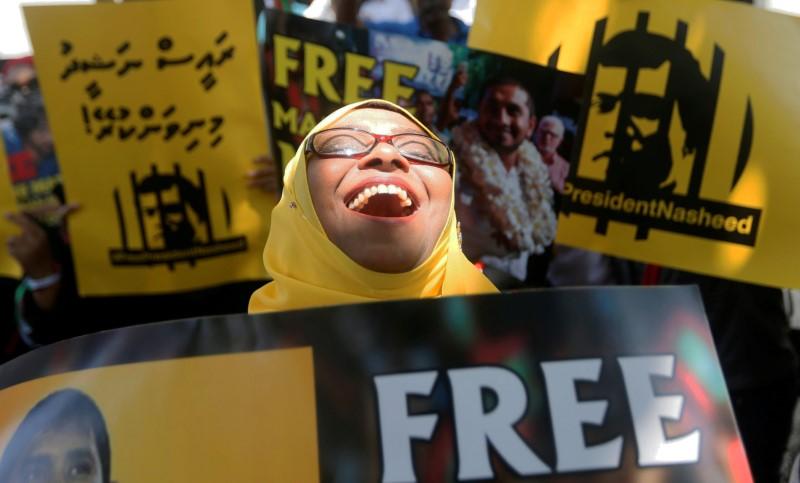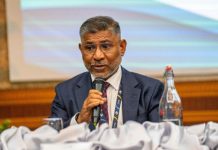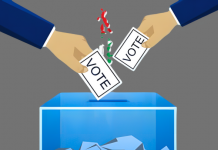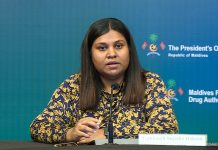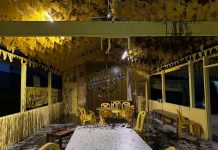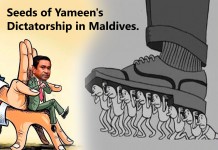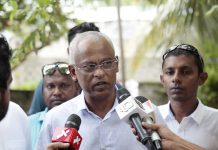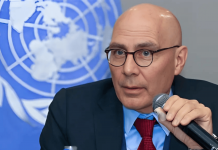The Maldives’ Election Commission should end its politically motivated exclusion of opposition party candidates from the September 2018 presidential elections .
The Election Commission announced in May it would reject the presidential candidacy of anyone convicted of criminal charges, effectively banning the four main opposition leaders from running. The commission also threatened to dissolve the opposition Maldivian Democratic Party (MDP) if its sole candidate, former President Mohamed Nasheed, contested the party’s May 30 primaries. The joint opposition accused the commission of being “hopelessly politicized” after it left only the incumbent president, Abdulla Yameen Abdul Gayoom, eligible to run.
“The Maldives’ Election Commission has shed its pretense of impartiality and independence with its rejection of opposition candidates,” said Brad Adams, Asia director. “The commission’s threats not only to oust candidates but to shut down entire parties pose a new risk to the country’s already jeopardized electoral freedoms.”
On May 20, the Election Commission announced that it would nullify any primary results in which the nominee failed to meet the qualifications for president outlined in the 2008 Constitution. Article 109(f) provides that the president cannot have been sentenced to more than 12 months in prison for a criminal offense within the past three years.
Nasheed, who served as the country’s first democratically elected leader from 2008 to 2012, was sentenced to 13 years in prison on terrorism charges in 2015. Both the United Nations Human Rights Committee and the Working Group on Arbitrary Detention have determined that the case was politically motivated and violated his rights to a fair trial and political participation under the International Covenant on Civil and Political Rights. In April, the Human Rights Committee stated that the “Maldives must restore ex-President Mohamed Nasheed’s right to stand for office, including the office of president.” The government rejected the committee’s call to quash the conviction.
President Yameen seems determined to hold onto power at the expense of citizens’ rights to a free and fair vote.
Brad Adams HRW Asia Director
The Election Commission’s declaration implicates the three other main opposition leaders as well, in similar cases of alleged security-related offenses, including former President Maumoon Abdul Gayoom, who is currently on trial on charges of terrorism and obstruction of justice.
The UN and Maldives’ international donors should urge the government to create conditions conducive to a free and fair election, including by dropping politically motivated cases against opposition leaders.
Nasheed, who has been campaigning from self-exile in Sri Lanka, is the only candidate to contest the MDP’s primaries, scheduled for May 30. On May 22, shortly after he submitted his official bid, the Election Commission notified the party that he was prohibited from running under the constitution and a 2015 amendment to the Prison and Parole Act that was passed two weeks after his conviction. The commission also threatened to dissolve the party under article 31 of the Political Parties Act if Nasheed refused to withdraw.
Since taking office in 2013, President Yameen has increasingly stifled the political opposition through arbitrary arrests and abuse of the judiciary. The upcoming presidential elections have created further occasions for attacks on democratic freedoms and political space.
The Supreme Court overturned the convictions of nine opposition leaders, including Nasheed, on February 1, 2018, in response to which President Yameen imposed a 45-day state of emergency. The decree led to the immediate arrest of two Supreme Court justices and a reversal of the court ruling. The two justices have since been sentenced to one-and-a-half to two years in prison and still face additional charges.
In a March report on the Maldives’ electoral reforms, the European Union noted “a significant loss of trust in the credibility of the EC [Election Commission] compared to 2014,” and that the commission “is reportedly seen as lacking independence from the government and ruling party.” The current Election Commission chair, a former secretary-general of President Yameen’s party, was appointed during the state of emergency in a parliamentary vote boycotted by the opposition.
The Election Commission is defined under article 167 of the constitution as “an independent and impartial institution.”
The Maldives chapter of Transparency International, an anti-corruption group, released a pre-election assessment in May that found widespread mistrust in the elections in part because “institutions with key roles in the conduct of elections have been hijacked by the ruling coalition.” On May 29, in the wake of increasing media coverage of Nasheed’s campaign, the Home Ministry and the Maldives Broadcasting Commission issued statements threatening media outlets with legal action if they continued reporting on individuals convicted of criminal charges.
“President Yameen seems determined to hold onto power at the expense of citizens’ rights to a free and fair vote,” Adams said. “His rejection of the UN rights committee’s ruling on political participation shows that he’s now compromising electoral rights across the islands.”
News Source- Opposition Candidates Barred From Election

